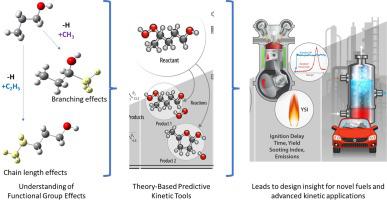Fuel ( IF 6.7 ) Pub Date : 2023-11-02 , DOI: 10.1016/j.fuel.2023.129999
Sheikh Ahmed , Katherine Lockwood , Jacob H. Miller , Nabila Huq , Jon Luecke , Nicole Labbe , Thomas Foust

|
The development of biochemicals and biofuels with advantaged properties of higher combustion efficiency at lower emission levels can be aided by a priori prediction of critical global characteristics based on molecular structure. Existing predictive techniques are incomplete for comprehensive ignition and physical fuel property prediction. This investigation focuses on filling this knowledge gap by developing a priori prediction techniques for predicting important ignition as well as physical fuel properties of promising advantaged biofuels. We demonstrate the utility of this a priori prediction technique on saturated (≤C5) alcohols, both linear and branched in nature by correlating their molecular structure with both important ignition and physical properties of the fuels. This work utilizes a semi-automated method of predicting ignition characteristics via accurate fundamental-based calculations of the fuel radical cascades that govern low-temperature combustion. This numerical methodology is supported by the relevant fuel ignition delay time (IDT) and research octane number (RON) data experimentally measured by the Advanced Fuel Ignition Delay Analyzer (AFIDA). Phyiscal fuel property trends are also analyzed by correlating the molecular structure of the fuel to its physical characteristics. Based on their molecular structure, recommendations are made on an a priori method for selecting biofuels that have advantaged properties for the selected fuel application. Lastly, the utility of this investigation is extended beyond the subset of alcohols considered by analyzing the IDT trends of i-Pentanol and n-Hexanol, revealing the fidelity of the novel kinetic modelling approach and the accuracy of the predicted trends in this study.
中文翻译:

了解生物燃料结构对点火和物理燃料特性的基本影响
基于分子结构的关键全局特征的先验预测可以帮助开发具有较高燃烧效率和较低排放水平的优势特性的生物化学品和生物燃料。现有的预测技术对于全面的点火和物理燃料特性预测来说是不完整的。这项研究的重点是通过开发先验预测技术来预测重要的点火以及有前途的优势生物燃料的物理燃料特性,从而填补这一知识空白。我们通过将分子结构与燃料的重要点火和物理特性相关联,展示了这种先验预测技术对饱和(≤ C 5 )醇(线性和支链)的实用性。这项工作采用半自动方法,通过对控制低温燃烧的燃料自由基级联进行精确的基于基础的计算来预测点火特性。该数值方法得到先进燃油点火延迟分析仪 (AFIDA) 实验测量的相关燃油点火延迟时间 (IDT) 和研究法辛烷值 (RON) 数据的支持。还通过将燃料的分子结构与其物理特性相关联来分析物理燃料特性趋势。根据其分子结构,提出了选择对所选燃料应用具有有利特性的生物燃料的先验方法的建议。最后,通过分析异戊醇和正己醇的 IDT 趋势,本研究的效用扩展到所考虑的醇子集之外,揭示了本研究中新型动力学建模方法的保真度和预测趋势的准确性。































 京公网安备 11010802027423号
京公网安备 11010802027423号